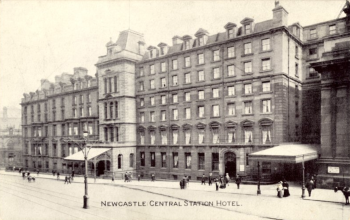From her room in the Central Station Hotel in Newcastle, Willena Benton excitedly wrote to her hometown newspaper on the great events taking place outside her window.
“England has sent an ultimatum demanding an answer before midnight. That probably means WAR!” Benton wrote in a letter dated Aug. 4, 1914 to the Belmont Courier; the newspaper started in 1889 by her husband, Everett Chamberlin Benton, Belmont’s most-prominent resident.
On a grand tour of northern Norway after the wedding of their second daughter, Dorothy, at their Oakley Road estate, the Bentons were stranded in England after passenger liners suspended North Sea trips to Christiania (which returned to its original name, Oslo, 11 years later) due to the threat of the Imperial German Navy venturing out of its Kiel base.
The Bentons, along with two dozen of their fellow Belmont residents – including Henry Yeoman, assistant Harvard dean, and his wife of 72 Trapelo Road – were attempting to find passage home among the few boats traveling to New York yet found “our letter of credit and our American Express cheques were not cashable” said Benton, leaving many, according to the Courier, “financially embarrassed abroad.”
“Nevertheless, strange to say, we are enjoying the excitement,” wrote Benton, especially all things “in a military way;” the marching of the Scotch regiments with kilts and bagpipes, the building of sandbags entrenchments, the weaving of barbed wire “and the gathering of the British war vessels in the Firth of Forth.”
Benton’s first-hand observation hardly conveyed the world-changing events beginning with an incident the Courier noted in its review of foreign events a month earlier. Between the news of Ernest Shackleton receiving a grant for his proposed Antarctic exposition and the typhoid epidemic in Jamaica, a small note informed Belmont readers that “Archduke Francis Ferdinand, heir to the dual monarchy of Austria-Hungry, and his wife were shot to death in the main street of Sarajevo, the Bosnian capital.”
A century later, countries across Europe this week observed the beginning of hostilities that would be called the “Great War” and later World War I. And while the war – that took the lives of nine million combatants and seven million civilians – forever changed the political and social norms around the world, many contend the conflict’s lessons are not restricted to historians; they are relevant today.
In an article in the Atlantic titled, “Just How Likely is Another World War,” Pinehurst Road’s Graham Allison takes a comprehensive assessment of the similarities and differences between 1914 and 2014 and just how close the world is to revisiting the unthinkable.
“In this centennial of what participants named the ‘Great War,’ many have recalled Mark Twain’s observation that while history never repeats itself, it does sometimes rhyme,” writes Allison, the director of the Belfer Center for Science and International Affairs and Douglas Dillon Professor of Government at Harvard’s Kennedy School of Government.








Leave a Review or Comment